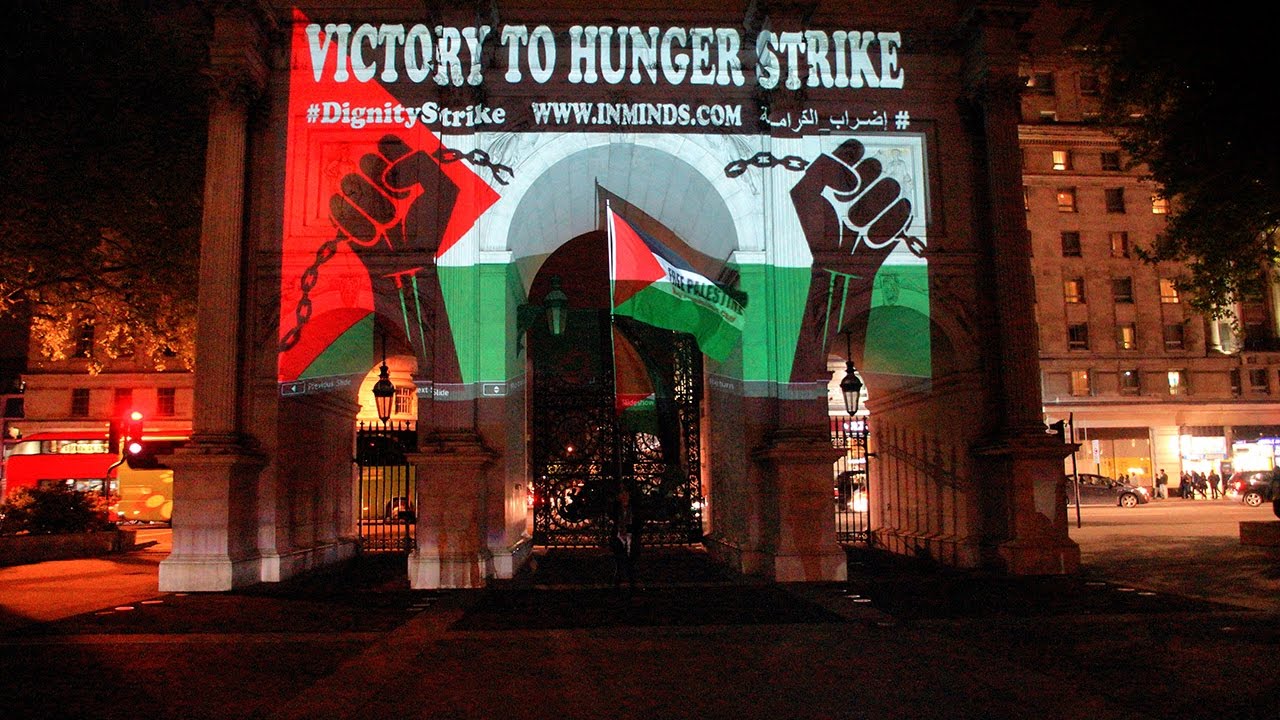
As Donald Trump repeats the mythmaking claims of US presidents to be able to bring ‘peace’ to the Middle East, the mass hunger strike of Palestinian political prisoners has forced Israel’s allies to check themselves. The street protests across occupied Palestine against Trump’s plan for an embassy in Jerusalem have pushed the plan back onto the shelf. Despite (and because of) the US government’s more open verbal support for Zionist settlements, a continuation of imperialist sponsorship and the anti-resistance actions of Mahmoud Abbas’ Palestinian Authority (PA), the crisis for Netanyahu and the Israeli ruling class remains. The movement of the prisoners expresses Palestinian determination for an alternative.
Amidst escalating PA collaboration with the Zionist occupation, and a near total blackout in the European and US media, conditions for Palestinian political prisoners incarcerated by Israel reached crisis point. On Palestinian Prisoners’ Day, 17 April, more than 1,500 out of a total 6,500 Palestinian prisoners began a coordinated hunger strike, demanding an end to administrative detention and solitary confinement, access to healthcare, more regular family visits and outside contact. The vast majority are imprisoned within the 1948 borders of the Israeli state, despite the clear illegality of transferring them from the West Bank and Gaza under the Geneva Conventions.
Families are repeatedly denied visiting requests by a military application process run by security agency Shin Bet. Najat Al Agha, a 67-year-old mother from Gaza, had five consecutive requests to visit her son Dia in Nafha prison refused. Israel has frequently given in to the demands of individual prisoners on hunger strike, only to cynically re-imprison them months later. In 2013, activist Samer Issawi spent 266 days on hunger strike, being force-fed by prison guards, before finally being granted release. He was imprisoned again six months later. His sister Shireen Issawi, who runs a prisoner support group in Jerusalem, has also since been locked up. The new wave of coordinated hunger strikes said enough is enough, demanding huriyya wa karaama: freedom and dignity.
Repression from the Zionist authorities was immediate. Strike leaders were thrown into isolation or dispersed to other prisons. PFLP activist Monzer Mifleh was moved from Hadarim to Ramle prison and then put into solitary confinement. The DFLP’s Wajdi Wawdat was transferred to the isolation unit at Jalameh. Leading Fatah member Marwan Bargouthi, a figurehead of the strike, was kept in solitary throughout. Military riot police were sent in with dogs to ransack rooms and seize prisoners en masse for transfer in the notorious metal bosta vans, where prisoners are shackled hand and foot, suffering frequent injuries. At the Naqab desert prison near the border with Egypt, prisoners were denied medical attention after being forcibly moved overnight from Gilbo’a prison in the mountainous north.
Throughout, the Israeli media slandered the hunger strikers, airing prison claims that Bargouthi had been caught eating, or that on 22 April 88 prisoners in Megiddo and Gilbo’a had ended their strike; aside from being false, on the same day the participant numbers rose as other Fatah and PFLP members joined the strike. On 4 May their ranks were swelled by leading activists including Ahmad Sa’adat and Ahed Abu Ghoulmeh (PFLP); Nael Barghouthi (PFLP-GC); Hassan Salameh, Abbas Al Sayed and Basem Al Khandakji (Hamas); and Ziad Bseiso, Tamim Salem and Saeed Al Tobsi (Islamic Jihad). Despite the organised campaign of intimidation by the Israeli state and media, the protests spread and the strikers refused to submit.
The cause of the prisoners became a rallying call for Palestinians as protests spread across the occupied territories with general strikes, marches and solidarity actions. The movement also exposed the splits in Fatah and the refusal of its corrupt bourgeois PA leadership to break with its policies of collaboration with the Zionist occupation. Despite Marwan Bargouthi’s pro-Oslo Accord politics, he is seen by many as pro-resistance and as a potential challenger to Abbas. On 3 May, as thousands marched in Ramallah in solidarity with the prisoners, Fatah prisoner support activist Qadoura Fares called for a ‘popular intifada in support of the intifada of the prisoners.’ The same day, PA/Fatah leader Abbas was at the White House, declaring: ‘we rely on God and Trump’. No mention of the prisoners. Trump said he would support Abbas, who would become ‘the Palestinian leader who signs his name to the final and most important peace agreement’. Less than a month later, during Trump’s visit to the West Bank, Trump was heard screaming at Abbas after the Israelis accused Abbas of ‘incitement.’ Eight Palestinians were shot and killed by Israeli gunfire in May.
The prisoners suspended their hunger strike after 40 days on 27 May, the beginning of Ramadan, after reaching a breakthrough in negotiations. The Palestinian Prisoners Affairs Commission said that 80% of the demands had been met including, crucially, communication with family members by phone and lifting the ‘security’ ban on hundreds of adults and children from visiting their relatives. Other concessions include access to improved medical facilities, exercise and educational materials.
PFLP leader Sa’adat saluted the ‘collective fruit of the efforts of the Palestinian people who rallied around the strike’, along with BDS and anti-imperialist campaigners internationally. The victory showed that firstly, ‘rights can only be taken and never begged for, and that the resistance was the main lever for all of the achievements of the Palestinian people in the successive eras of the revolution.’ For Sa’adat, this collective action was evidence that the crisis in the national leadership can be challenged and overcome. Palestinians in Gaza have protested against massive PA cuts to salaries, seen as a vindictive swipe at the Hamas government; in the region with the highest unemployment rate in the world, the EU also plans to cut funding to Gaza projects later this year.
Louis Brehony
Fight Racism! Fight Imperialism! 258 June/July 2017




